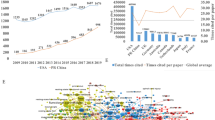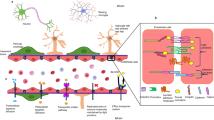Abstract
Purpose
Postpartum depression (PPD) affects nearly 10% of mothers after delivery and has many serious results. Although many factors associated with PPD, the etiology, and pathophysiology of PPD are not known completely. The relationship between serum serotonin concentration and depression is well known, but there are no enough data regarding the serum change of leptin and adiponectin. The aims of this study are to research the level of serum serotonin, leptin,s and adiponectin concentrations in women with PPD.
Materials and methods
A controlled trial has been conducted in three centers. Two hundred and forty four women were evaluated at postpartum day 10 with the Edinburgh Postnatal Depression Scale (EPDD). Venous blood samples were collected and serotonin, and leptin and adiponectin levels were studied using human enzyme-linked immunosorbent assay. Mann–Whitney U test was used for comparison of serum levels of serotonin, leptin, and adiponectin between women with PPD and without. A p value of <0.05 was considered significant.
Results
PPD was detected in 70 postpartum women. The mean serum serotonin level was significantly lower in the group with PPD (p = 0.001), while mean serum adiponectin level was higher (p = 0.001). The mean serum leptin level was not different (p = 0.133).
Conclusions
The serum adiponectin and leptin levels were high in women with PPD. This could play important role in the pathophysiology of PPD. Elevation of serum levels also may play antidepressant role against PPD, especially the early postpartum period.
Similar content being viewed by others
References
Skalkidou A, Sylvén SM, Papadopoulos FC, Olovsson M, Larsson A, Sundström-Poromaa I (2009) Risk of postpartum depression in association with serum leptin and interleukin-6 levels at delivery: a nested case-control study within the UPPSAT cohort. Psychoneuroendocrinology 34:1329–1337
Gavin NI, Gaynes BN, Lohr KN, Meltzer-Brody S, Gartlehner G, Swinson T (2005) Perinatal depression:a systematic review of prevalence and incidence. Obstet Gynecol 106:1071–1083
Petrosyan D, Armenian HK, Arzoumanian K (2011) Interaction of maternal age and mode of delivery in the development of postpartum depression in Yerevan, Armenia. J Affect Disord 135:77–81
Veen C, Myint AM, Burgerhout KM et al (2016) Tryptophan pathway alterations in the postpartum period and in acute postpartum psychosis and depression. J Affect Disord 189:298–305
Mansur RB, Rizzo LB, Santos CM et al (2016) Adipokines, metabolic dysfunction and illness course in bipolar disorder. J Psychiatr Res 74:63–69
Rebelo F, Farias DR, Struchiner CJ, Kac G (2016) Plasma adiponectin and depressive symptoms during pregnancy and the postpartum period: a prospective cohort study. J Affect Disord 194:171–179
Karaçam Z, Kitiş Y (2008) The Postpartum Depression Screening Scale: its reliability and validity for the Turkish population. Turk Psikiyatri Derg 19:187–196
Kohl C, Walch T, Huber R et al (2005) Measurement of tryptophan, kynurenine and neopterin in women with and withou postpartum blues. J Affect Disord 86:135–142
Maes M, Bonaccorso S, Marino V et al (2001) Treatment with interferon-alpha(IFNalpha) of hepatitis C patients induces lower serum dipeptidyl peptidase I Vactivity, which is related to IFN alpha-induced depressive and anxiety symptoms and immune activation. Mol Psychiatry 16:475–480
Okuda S, Nishiyama N, Saito H, Katsuki H (1998) 3-Hydroxykynurenine an endogenous oxidative stress generator causes neuronal cell death with apoptotic features and region selectivity. J Neurochem 70:299–307
Schwarcz R, Whetsell WO Jr, Mangano RM (1983). Quinolinic acid: an endogenous metabolite that produces axon-sparing lesions in rat brain. Science 21:219:316–318.
Deuschle M, Blum WF, Englaro P et al (1996) Plasma leptin in depressed patients and healthy controls. Horm Metab Res 28:714–717
Antonijevic IA, Murck H, Frieboes RM, Horn R, Brabant G, Steiger A (1998) Elevated nocturnal profiles of serum leptin in patients with depression. J Psychiatr Res 32:403–410
Gecici O, Kuloglu M, Atmaca M et al (2005) High serum leptin levels in depressive disorders with atypical features. Psychiatry Clin Neurosci 59:736–738
Kraus T, Haack M, Schuld A, Hinze-Selch D, Pollmacher T (2001) Low leptin levels but normal body mass indices in patients with depression or schizophrenia. Neuroendocrinology 73:243–247
Jow GM, Yang TT, Chen CL (2006) Leptin and cholesterol levels are low in major depressive disorder, but high in schizophrenia. J Affect Disord 90:21–27
Pasco JA, Jacka FN, Williams LJ et al (2008) Leptin in depressed women: cross-sectional and longitudinal data from an epidemiologic study. J Affect Disord 107:221–225
Rubin RT, Rhodes ME, Czambel RK (2002) Sexual diergism of baseline plasma leptin and leptin suppression by arginine vasopressin in major depressives and matched controls. Psychiatry Res 113:255–268
Esel E, Ozsoy S, Tutus A et al (2005) Effects of antidepressant treatment and of gender on serum leptin levels in patients with major depression. Prog Neuropsychopharmacol Biol Psychiatry 2:565–570
Leibowitz SF, Alexander JT (1998) Hypothalamic serotonin in control of eating behavior, meal size, and body weight. Biol Psychiatry 44:851–864
Liu J, Guo M, Zhang D, Cheng SY, Liu M, Ding J et al (2012) Adiponectin is critical in determining susceptibility to depressive behaviors and has antidepressant-like activity. Proc Natl Acad Sci U S A 109:12248–12253
Nicolas S, Veyssiere J, Gandin C et al (2015) Neurogenesis-independent antidepressant-like effects of enriched environment is dependent on adiponectin. Psychoneuroendocrinology 57:72–83
Nishimura M, Izumiya Y, Higuchi A et al (2008) Adiponectin prevents cerebral ischemic injury through endothelial nitric oxide synthase dependent mechanisms. Circulation 117:216–223
Zhang D, Guo M, Zhang W, Lu XY (2011) Adiponectin stimulates proliferation of adult hippocampal neural stem/progenitor cells through activation of p38 mitogen-activated protein kinase (p38MAPK)/glycogen synthase kinase 3β (GSK-3β)/β-catenin signaling cascade. J Biol Chem 30(286):44913–44920
Wędrychowicz A, Zając A, Pilecki M, Kościelniak B, Tomasik PJ (2014) Peptides from adipose tissue in mental disorders.WorldJ. Psychiatry 4:103–111
Carvalho AF, Rocha DQC, McIntyre RS et al (2014) Adipokines as emerging depression biomarkers: a systematic review and meta-analysis. J Psychiatr Res 59:28–37
Hu Y, Dong X, Chen J (2015) Adiponectin and depression: a meta-analysis. Biomed Rep 3:38–42
Woolhouse H, Gartland D, Mensah F, Giallo R, Brown S (2016) Maternal depression from pregnancy to 4 years postpartum and emotional/behavioural difficulties in children: results from a prospective pregnancy cohort study. Arch Womens Ment Health 19:141–151
Jeong HG, Min BJ, Lim S et al (2012) Plasma adiponectin elevation in elderly individuals with subsyndromal depression. Psychoneuroendocrinology 37:948–955
Acknowledgements
There is no financial relationship with any biotechnology manufacturer, any pharmaceutical company, or other commercial entity that has an interest in the subject matter or materials discussed in the manuscript. The study was registered on clinical trials.gov with No NCT02682004.
Author contrıbutıon statement
GY: Data collection. MBS: Project development, manuscript writing. PY: Data collection. YC: Data collection. MSB: Literature reviewing. EC: Literature reviewing, statistical analysis.
Author information
Authors and Affiliations
Corresponding author
Ethics declarations
Funding
This study was not supported by any company or institution.
Conflict of interest
The authors declared that there is no conflict of interest.
Ethical approval
All procedures performed in studies involving human participants were in accordance with the ethical standards of the institutional research committee and with the 1964 Helsinki declaration and its later amendments or comparable ethical standards. The design of the study was approved by the local ethics committee of Zeynep Kamil Training and Research Hospital with No. 51.
Rights and permissions
About this article
Cite this article
Yildiz, G., Senturk, M.B., Yildiz, P. et al. Serum serotonin, leptin, and adiponectin changes in women with postpartum depression: controlled study. Arch Gynecol Obstet 295, 853–858 (2017). https://doi.org/10.1007/s00404-017-4313-0
Received:
Accepted:
Published:
Issue Date:
DOI: https://doi.org/10.1007/s00404-017-4313-0




